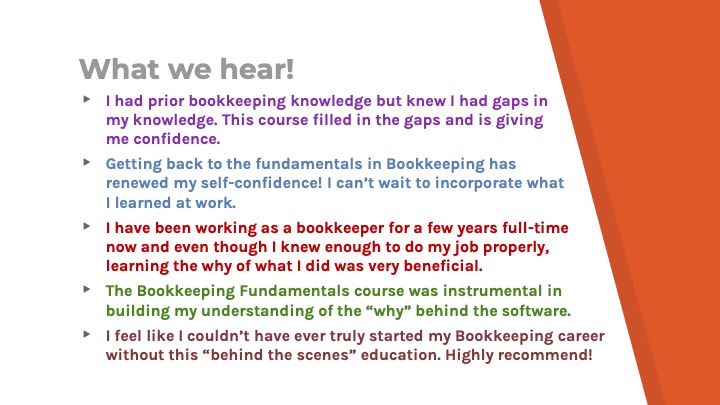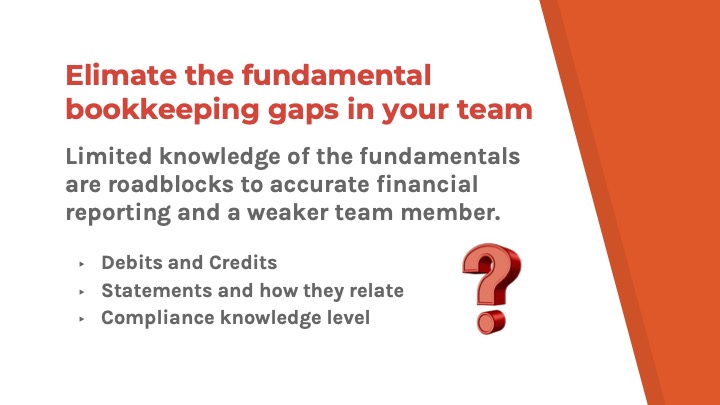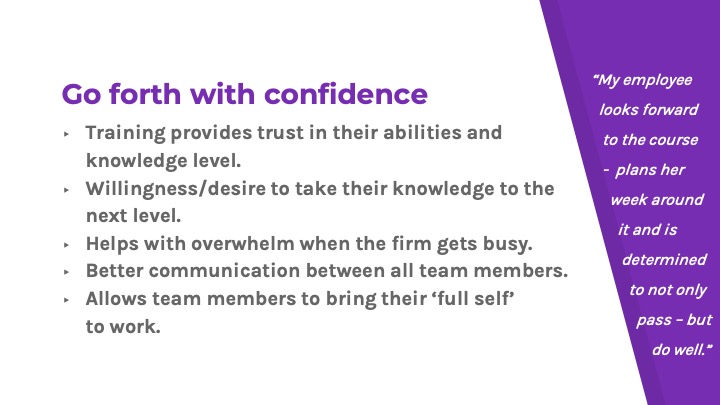Dianne
Thank you so much, Juliette. We’d also like to thank you and of course, Kninja Network for the opportunity to discuss the importance of supporting and training your team to achieve mastery.
So, if we look at what mastery is, the title of this webinar that we’re doing today, and how we get there, I think without a doubt, we’re all going to agree it takes three fundamental things to actually get to that end result.
- The first one of course, is training
- the second is understanding
- and the third is ongoing practice
And this is true, of course, of any discipline that we try to master.
So let’s think of an artist who wants to paint a picture. They must first learn the foundational concepts of that picture before they can even put any brush to the canvas. Color is a big one, and that’s how to create from the basic color wheel all the various colors that they’re going to need. Value, that’s the weight of light and shadows on an object. 5 And then the final one is Composition. How to lay out the picture in a scene that is very pleasing for people to look at.
So now let’s take 10 seconds for you to read the slide with the honest feedback from our bookkeeping students. We have only put five statements on the screen – but, let me tell you – it is very consistent with the message that we hear from most of the bookkeepers that provide feedback to us, and we ask for that feedback in every one of our courses.

Essentially, as you read through that slide, you’re going to come to the same conclusion that essentially before taking our manual bookkeeping course the students were struggling with understanding the ‘Why’, along with the lack of confidence and the proper transactional workflow and Juliet just touched on some of those things that they also found when they were doing their surveys.
So they would enter the transaction and let the software handle the rest, and hope for the best at month’s end – and that’s literally their comments. So going back to what Juliet was saying, too, their confidence was not there, and they were holding back who they could be because of that.
So, this was true for both seasonal bookkeepers – so those that take our advanced class – and the beginners, which we thought was really interesting. In fact, we have a lot of students who, at the end of our manual bookkeeping course, concluded that really their jobs to that point – had been mostly data entry positions – and that they – as a professional bookkeeper position – they felt that they would not able at that point to be able to master the bookkeeping profession. They had not achieved what they needed, which was the foundational theory of bookkeeping. So – what I’d like to do now is let’s hear from you and where are your team struggles?
Dianne
one of the things that we hear back from employers a lot, that once they get back into their workplace, they see an immediate increase in the confidence level that that person had.

So, today’s software and apps, they do a good job with a little supervision at covering the data entry position in your firms. And they will, of course, save time and money. And our goal in Trifold is certainly not to do manual bookkeeping, but to embrace the ever-changing technology that gets the job done faster by automating the data entry tasks that we used to have to do individually – all on our own.
However, we believe that these tools have actually done a service by highlighteding the need for bookkeeping knowledge and understanding and training. It’s about the interpretation and the review of the automatic data entry that we need to make sure our employees and team members have behind them.
To be honest – just like some of you in this webinar today, I suspect (that have been at this for a little while), we have had very little (if any at all) technical bookkeeping training available to us back when we started. We learned on the job. It was slow, stressful, and often costly to the firm. Errors were made. Time was wasted in corrections. Babysitting was required by a senior staff member. But today, accounting firms and bookkeeping firms cannot afford this slow progress. Team members must be able to hit the ground running and contribute to the bottom line by understanding the results produced by the automated data entry. And that’s now become one of the main focuses for Trifold.
So, whether you are a small firm out on your own – or you are building a modern day serving a large client base – the team must understand the technical aspects of the professional beyond – much beyond – data entry. So many of the software-trained bookkeeping students that we get (we see them every single day in our courses), do not understand what the software that they are using is doing behind the scenes. And we get that comment all the time. It appears to them to be single-entry bookkeeping, because that’s all they see on the screen when they’re posting into software.
Building strong, confident, contributing team members requires eliminating their knowledge gaps in this area and providing the understanding required to move them from data entry clerks into professional bookkeepers. Doing this will also, of course, elevate your firm and also provide a mastery into bookkeeping status.
If you ask anyone on your team, can they recreate a transaction using a T-Account? Can they? Can they explain in detail the Equity section of the Balance Sheet and how that interacts with the Income Statement? Where is their sales tax knowledge? Now we need to know everything about sales tax all across Canada and how it affects out of country. Can they manually reconcile their sales tax remittances to the revenue? Can they tell your clients what their gross profit number is?
Providing targeted training is so important. What training is required for a bookkeeping position today? Well, definitely they must start with technical bookkeeping, period. Full stop.
Office administrator is a different position in the modern-day bookkeeping firm – or at least it should be. So – if the goal is mastery, there is not much value in taking training that is three- or four- weeks bookkeeping theory, a lesson in PowerPoint, three weeks of Sage, three weeks of QuickBooks or QBO training. And currently our colleges and the courses they offer in bookkeeping are not providing what the professional bookkeeping firm needs today. They are lagging behind technology. They are very concentrated on software and not on all of the other tools that a bookkeeper needs to be aware of and use going forward into our future.

Setting up your team members with a solid foundation to be successful in all of the upcoming and ongoing technology changes that we will face in a future bookkeeping firm and career – and in turn that will benefit them and provide real value and growth also in your firm.
Having a tool to help you do that is a knowledge questionnaire, and Trifold can help assess your team members with that and provide a way for you to establish an effective and efficient training plan.
In part two, I’m going to turn it over now to hear from our head instructor at Trifold, and that’s Shelley Rudiger, for her insights. Shelley, take it away.
